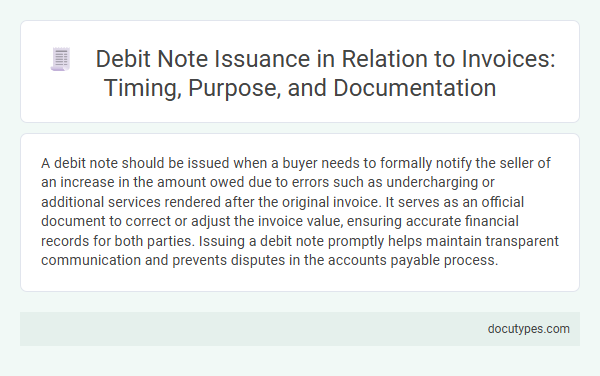A debit note should be issued when a buyer needs to formally notify the seller of an increase in the amount owed due to errors such as undercharging or additional services rendered after the original invoice. It serves as an official document to correct or adjust the invoice value, ensuring accurate financial records for both parties. Issuing a debit note promptly helps maintain transparent communication and prevents disputes in the accounts payable process.
Introduction to Debit Notes and Invoices
Invoices serve as formal requests for payment, detailing the products or services provided along with their costs. A debit note is issued to notify a buyer of an increase in the amount owed, often due to errors or additional charges related to the original invoice. You should issue a debit note when correcting undercharged invoices or when extra costs must be added after the initial billing.
Definition and Purpose of Debit Note Issuance
When should a debit note be issued in relation to invoices? A debit note is issued when there is a need to increase the amount payable by the buyer due to reasons such as underbilling, pricing errors, or additional goods supplied. It serves as an official document to notify the buyer of the adjustment and facilitates accurate accounting between both parties.
Key Differences Between Debit Notes and Invoices
A debit note should be issued when there is a need to amend or increase the amount originally stated in an invoice. It serves as a formal request for payment adjustment related to discrepancies or additional charges.
- Purpose Difference - An invoice demands payment for goods or services supplied, while a debit note requests an increase in an already invoiced amount.
- Timing Difference - Invoices are issued at the point of sale or service delivery, whereas debit notes are issued after the invoice to correct or update the value.
- Financial Impact - Invoices signify amount payable by the buyer, but debit notes indicate additional amounts that the buyer needs to pay beyond the initial invoice.
Common Scenarios Requiring Debit Notes
A debit note should be issued when there is a need to increase the amount billed in a previously issued invoice. Common scenarios include correcting undercharged amounts or accounting for additional costs that were not included initially.
You might issue a debit note when goods are returned but found to be damaged, requiring extra charges for handling. Another scenario involves adjustments due to pricing errors or additional services rendered after the original invoice date.
Timing for Issuing Debit Notes Against Invoices
| Timing for Issuing Debit Notes Against Invoices |
|---|
|
A debit note should be issued promptly after identifying discrepancies or additional charges related to an original invoice. The timing typically depends on the nature of the adjustment required: 1. Post-Invoice Discovery of Errors: If errors such as undercharged amounts or overlooked items are found after the invoice has been sent, issue a debit note as soon as possible to amend the billing records. 2. Additional Services or Goods Provided: When extra services or goods are supplied beyond the scope of the initial invoice, a debit note must be issued immediately to request payment for the added value. 3. Contractual or Agreement Terms: Follow any specific timelines outlined in contracts or agreements for issuing debit notes to ensure compliance and avoid payment delays. Timely issuance of debit notes protects your financial interests and maintains transparent communication with clients or vendors. Delays in issuing debit notes can lead to accounting complexities and disputes over payment obligations. |
Legal and Regulatory Requirements for Debit Notes
A debit note must be issued promptly to rectify discrepancies or errors identified after an invoice has been issued. Legal and regulatory frameworks often mandate specific conditions under which debit notes are valid and enforceable.
- Correction of Underbilling - A debit note addresses instances where the original invoice amount was underestimated due to pricing errors or omitted items.
- Tax Compliance - Debit notes must adhere to tax regulations, ensuring accurate reporting of adjustments for VAT or GST purposes.
- Contractual Obligations - Issuance of debit notes often depends on terms stipulated within sales contracts or local commerce laws.
Failure to issue debit notes in accordance with legal requirements can result in financial penalties and complicate audit trails.
Essential Components of a Debit Note Document
A debit note should be issued when a customer returns goods, when there is an undercharged invoice, or to correct billing errors. Essential components of a debit note include the original invoice number, the reason for issuance, and the adjusted amount to be debited. Accurate details ensure clarity in financial records and facilitate prompt resolution between parties.
Documentation Workflow: Linking Debit Notes to Invoices
Debit notes should be issued whenever there is a need to adjust an invoice due to discrepancies such as returned goods, pricing errors, or overcharges. This ensures accurate documentation and maintains a clear financial record between the buyer and seller.
Linking debit notes directly to the original invoice within your documentation workflow streamlines the audit process and enhances traceability. Properly connected records facilitate quick verification, reducing disputes and ensuring compliance with accounting standards.
Best Practices for Debit Note Management
A debit note should be issued promptly when there is a need to correct or increase the amount on an original invoice due to underbilling or additional charges. Timely issuance helps maintain accurate financial records and ensures transparent communication between parties.
Best practices for debit note management include verifying the original invoice details before issuance, clearly stating the reason for the debit note, and linking it directly to the corresponding invoice number. Maintaining a standardized format enhances clarity and facilitates easier reconciliation. Regular audits of debit notes also help prevent discrepancies and support accurate accounting practices.
When Should a Debit Note Be Issued in Relation to Invoices? Infographic

